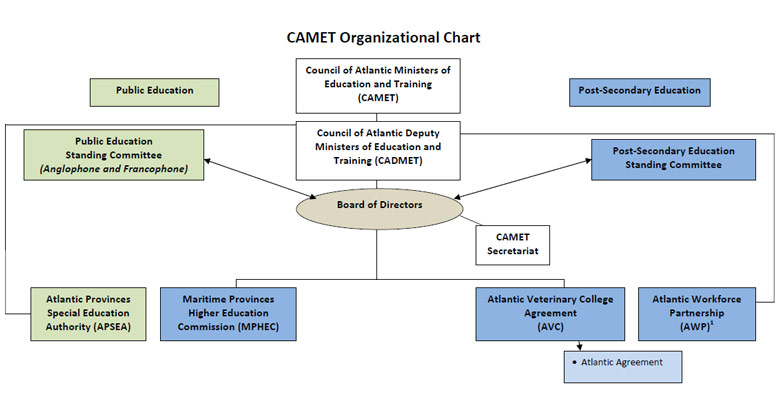About CAMET
In 2004, the Council of Atlantic Ministers of Education and Training (CAMET) was established to replace the Atlantic Provinces Education Foundation (APEF). CAMET was established to continue and further enhance the level of cooperation in public and post-secondary education by working on common issues to improve learning for all Atlantic Canadians, optimize efficiencies, and bring added value to provincial initiatives and priorities in public and post-secondary education.
The establishment of CAMET follows the long-standing success of Maritime and Atlantic intergovernmental cooperation in education and the long history of working together for the benefit of the public education systems.
According to a signed Agreement, the mandate and goals of the Council of Atlantic Ministers of Education and Training (CAMET) are
- to promote regional cooperation in education among the respective governments, by maximising efficiencies and cost effectiveness through regional purchasing and pooling of funds
- to develop and advance a number of initiatives for cooperation in education, by minimizing unnecessary duplication of work among Atlantic departments of education
- to establish the framework for joint undertakings, by serving as a catalyst for positive change in education
The governance structure of the CAMET includes the Council of Atlantic Deputy Ministers of Education and Training (CADMET) and the CAMET Board of Directors. CADMET is accountable for the approval of the annual general direction and budget for CAMET and for the Maritime Provinces Higher Education Commission (MPHEC). The CAMET Board of Directors, composed of public and post-secondary education senior officials, is accountable for implementation of the CAMET direction and priorities, oversight of the CAMET Secretariat, andday-to-day oversight of and liaison with the MPHEC.
CAMET SECRETARIAT
The CAMET Secretariat serves as the functioning body of CAMET and has overall responsibility to expedite the work of CAMET. It performs head office functions and assists various committees in meeting their goals by providing administrative and logistical support, encouraging regional approaches in provincial decision making, and providing institutional memory.
